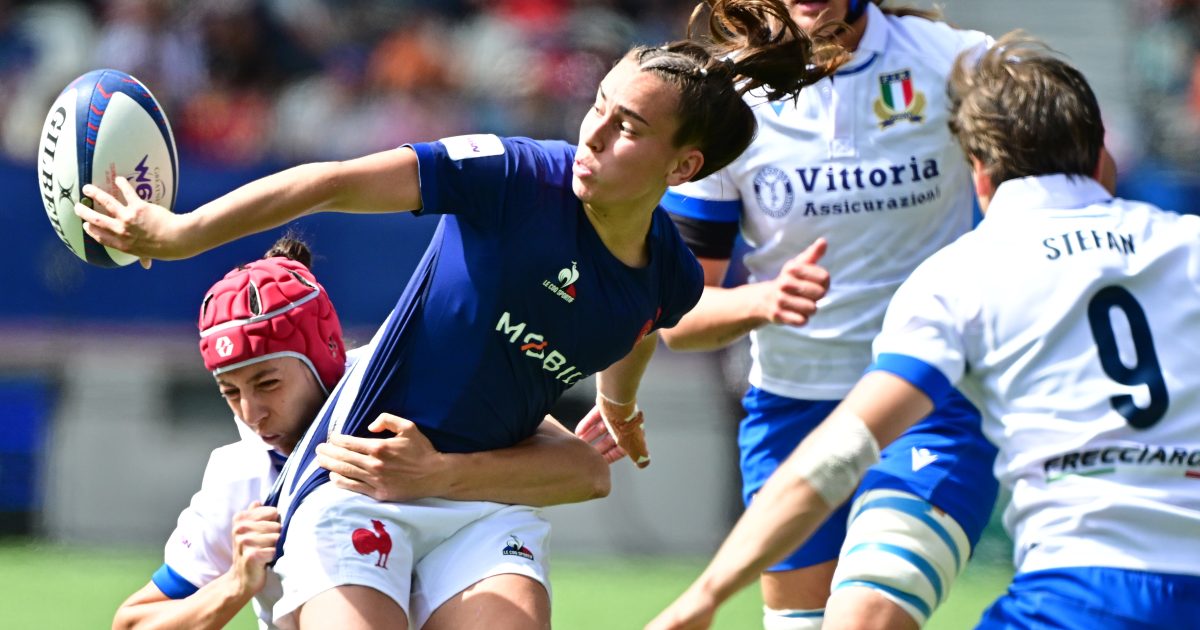Comment les Françaises jugent leur nouveau projet de jeu

Il est d’usage de penser que le rugby féminin, par essence, est le plus proche de ce que proposaient les Français à la grande époque, basé sur ce fameux French flair initié par André Boniface et consorts, ce jeu de coups, de fulgurances, de offloads créant de l’incertitude chez l’adversaire, des actions inattendues ou tout peut arriver. Le meilleur… comme le pire aussi.
La stratégie du duo de sélectionneurs Gaëlle Mignot et David Ortiz est depuis le début de ce Tournoi des Six Nations 2024 de tenter, d’oser, quitte à se mettre en danger, à créer du déchet, à se précipiter. Un écueil assumé par le staff mais qu’il tend à corriger au fil des entraînements en groupe.
Du pour et du contre, donc. Mais pour les joueuses, c’est le pour qui arrive en tête lorsqu’on leur pose la question. « Les filles comprennent de mieux en mieux le projet de jeu et on prend beaucoup de plaisir sur le terrain, comme vous avez pu le voir », certifie la deuxième-ligne Madoussou Fall (26 ans, 28 sélections), rappelée dans le groupe de cette année après une blessure.
Le déchet, oui, mais quand on l’anticipe
« On a un peu plus de liberté sur ce nouveau projet de jeu », confirme la pilier Clara Joyeux (26 ans, 43 sélections). « Sur les entraînements il y a plus de déchets qu’en match, mais on se laisse le droit d’en avoir parce qu’on tente et à force de tenter, ça passe.
« On a cette permission, même s’il faut rester vigilantes et savoir dire stop, parfois resserrer un peu le jeu pour après le redéployer. On se laisse cette possibilité. C’est plus agréable à regarder et pour nous c’est plus agréable à jouer. »
« Ce qui caractérise notre équipe, c’est aussi la défense », rappelle la troisième-ligne centre Emeline Gros (28 ans, 31 sélections). « Ça a toujours été un gros point, notre moteur. En défense on s’améliore d’entrainement en entrainement, de match en match.
« Quand on a un projet sur l’offensive qui est un peu plus libéré, avec un peu plus de déchets, on sait qu’il faut être très réactives sur toutes les phrases qui peuvent être à double tranchant et notamment sur les turnovers. Ce sont des choses que l’on travaille à l’entrainement : des ballons mis dans le désordre, d’avoir la capacité de switcher de l’attaque à la défense pour être le plus performantes en match. »
L’importance du jeu au pied
Savoir switcher est un principe essentiel de ce nouveau projet de jeu : entre attaque et défense, ainsi qu’entre jeu à la main et jeu au pied qui devient progressivement une nouvelle arme pour les Bleus sous la férule de Romain Teulet, deuxième meilleur réalisateur de l’histoire du Top 14 (derrière Richard Dourthe), auteur de plus de 3000 points avec Castres.
« On arrive peu à peu à trouver cette bonne alternance entre le jeu à la main et le jeu au pied. On sait de mieux en mieux l’utiliser », constate la jeune demie d’ouverture ou arrière Morgane Bourgeois (21 ans, 7 sélections). « Notre utilisation du jeu au pied est de plus en pertinente comme on l’a vu sur le match de ce week-end (contre l’Italie, ndlr).
« J’ai joué au foot et je fais partie de ces filles qui aiment taper dans le ballon. Dans le rugby féminin jusqu’ici le jeu au pied n’était pas forcément une arme mais ça va le devenir de plus en plus. Il faut que l’on soit compétentes dans ce domaine-là et on essaie de s’équiper. »
Un avis partagé par sa partenaire à l’arrière Emilie Boulard (24 ans, 29 sélections) : « Si je prends le match de l’Ecosse, c’était compliqué parce qu’il y avait beaucoup de vent. Mais dans l’ensemble, je trouve que c’était correct car on a trouvé de la longueur.

« Sans mettre en difficulté l’adversaire, on arrivait à trouver les espaces libres. Je pense qu’on a été plutôt bonnes sur ce genre d’attaque. Après, bien sûr il faut optimiser, trouver plus de longueur, mettre dans le dos des adversaires, les lobber pour qu’on puisse chasser et les mettre sous pression. »
Encore un match à passer avant de rencontrer l’Angleterre pour ce Crunch qui est attendu depuis le début. Avant cela, les Françaises feront le déplacement au Pays de Galles dimanche 21 avril pour une nouvelle occasion de peaufiner un système de jeu qui est destiné à perturber et faire douter les numéros un mondiales.




